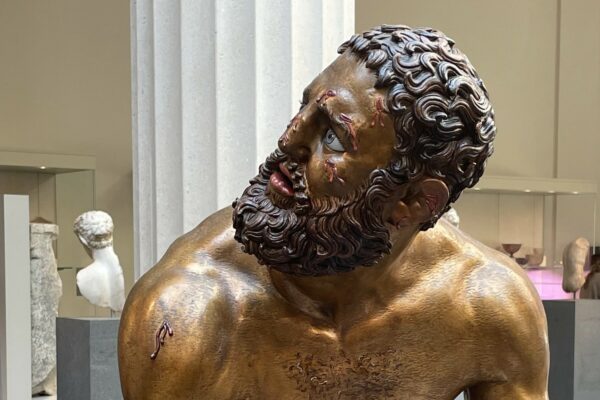Interested in earning your Classics Minor while fulfilling your GEC requirements? Click here to learn more.
Arts and Humanities
CLAS-C 101 Ancient Greek Culture (3 cr.) and CLAS-C 102 Roman Culture (3 cr.)
When you take our introductory survey courses, you engage in historical and topical introductions to ancient Greek and Roman cultures, both as distinct past societies and forces that continues to shape modern life. Topics covered include geography, economics, politics, philosophy, religion, architecture, and technology. You study these topics through representative works of art, artifacts, and literature. You also think critically about important questions: How was ancient society organized? What was daily-life like for various groups (elite and poor, free and enslaved, male and female…)? How do we interpret different types of evidence about the past, including written and archaeological sources? How do ancient cultures continue to shape the world we inhabit today?
CLAS-C 205 Classical Mythology (3 cr.)
What do Shakespeare, Dante, Percy Jackson, and Game of Thrones all have in common? They all draw heavily on Classical Mythology, the myths of Ancient Greece and Rome. Learn about these important societies through the lens of the stories they told about themselves. Meet Achilles, a warrior searching for meaning on the battlefield. Meet Medea, a powerful woman raging against social conformity. Meet Hercules, Theseus, Perseus, and other heroes as they destroy their loved ones in a quest for glory. Visit the ancient world and see what it can tell us about ourselves.
Cultural Understanding
CLAS-C 213 Sport and Competition in the Ancient World (3 cr.)
The Olympics, theater, a general obsession with entertainment spectacles: our modern society can trace the origins of all these directly to Greek and Roman societies. Like our world, ancient Mediterranean cultures were engrossed by competitions of strength, speed, stamina, and skill. Their languages gave us terms such as “theater,” “stadium,” “orchestra,” “chorus,” and “arena.” Their art, homes, and public spaces were filled with images of athletes and gladiators. This class will provide you with an introduction to competition in the ancient world and encourage you to think critically about the relationships with modern competition.
CLAS-L 131 Beginning Latin I (4 cr.) and CLAS-L 132 Beginning Latin II (4 cr.)
Latin is not only the language of the Ancient Romans, but the language of centuries of scholarship, both scientific and religious. Cicero, Ovid, and Julius Caesar spoke Latin; Copernicus and St. Augustine wrote it; Jefferson, Hamilton, and Tolkien read it. As the parent language of 5 modern languages (including Spanish, French, and Italian) and the root language over 30% of English words, Latin teaches vocabulary and grammar skills that can facilitate further language acquisition, especially in medical and scientific fields. In our classes you will learn the basics of Latin vocabulary and grammar with an eye to developing direct reading comprehension. You will also learn about Ancient Roman society, literature, religion, and culture. For L131 all are welcome: no previous knowledge of Latin required. For L132 previous experience (equivalent to one semester) in Latin is necessary for success.


